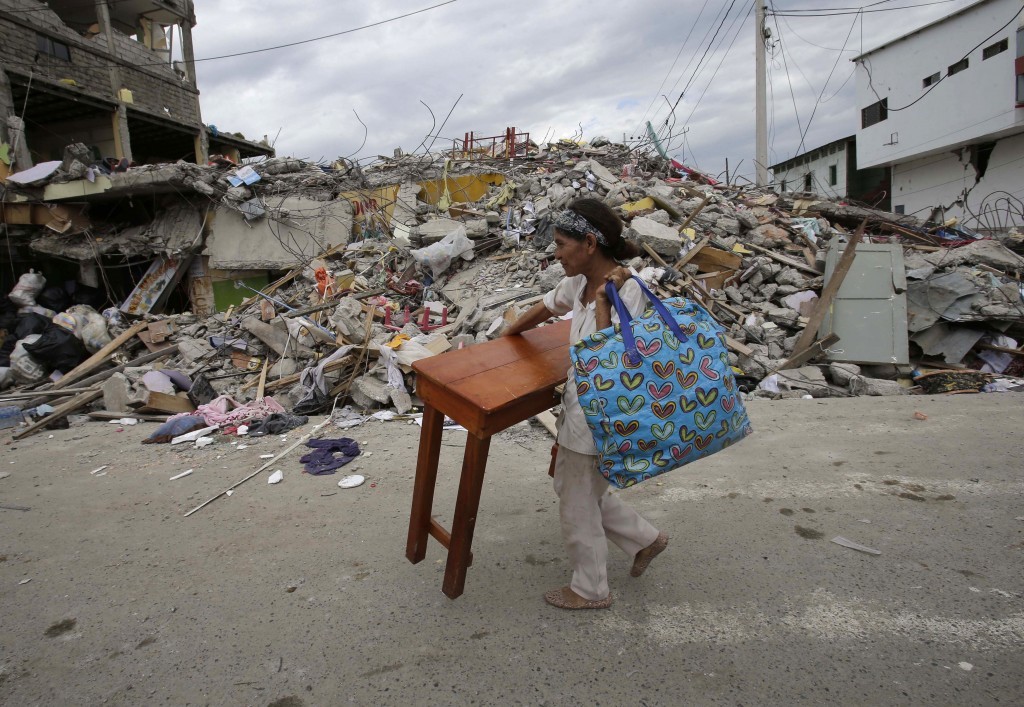
President Rafael Correa is raising taxes and imposing a one-off levy on millionaires to rebuild cities devastated by Ecuador’s worst earthquake in decades.
In a televised address, Mr Correa said damages from the 7.8-magnitude quake would probably run into the billions of dollars, adding to already heavy economic hardships in the OPEC nation triggered by the collapse in world oil prices.
The task of rebuilding should not fall only to communities along the coast in the quake’s path but would require sacrifices from all segments of Ecuadorean society according to their ability to contribute, Mr Correa said.
“I know we’re at the most-difficult stage right now but it’s just the beginning,” he said.
Using authority granted by the state of emergency he declared after Saturday night’s quake, Mr Correa said sales taxes would increase to 14% from 12% for the coming year.
People with more than one million dollars (£700,000) in assets will be charged a one-time tax of 0.9% on their wealth, while workers earning more than 1,000 dollars (£700) a month will be forced to contribute a day’s wages and those earning 5,000 a month the equivalent of five days’ pay.
Taxes on companies will also go up and Mr Correa said he would look at selling certain state assets that he did not specify. He is also drawing on 600 million dollars (£420m) in emergency credits from the World Bank and other multilateral lenders.
The tax increases come as the scale of devastation continues to sink in. A helicopter flyover of the damage zone showed entire city areas in ruins as if they had been bombed.
The latest death toll stands at 570, with163 people as missing and more than 23,500 made homeless. The final death toll could surpass casualties from earthquakes in Chile and Peru in the past decade.
Even as authorities turn to restoring electricity and clearing debris, the earth continued to move. A magnitude-6.1 aftershock before dawn on Wednesday set babies crying and sent nervous residents pouring into the streets. Local seismologists had recorded more than 550 aftershocks, some felt 105 miles away in the capital of Quito.
Rescuers who have arrived from Mexico, Colombia, Spain and other nations said they would keep searching for survivors, but warned that time was running out and the likelihood of finding more people alive grew smaller with the passage of every hour.
Among the survivors, the situation was growing increasingly tense. While humanitarian aid has been pouring in from around the world, distribution is slow. In Manta on Wednesday, people waited for hours under the tropical sun for water and food supplies. Soldiers kept control with fenced barricades.
“They looted the store. I’m taking out what little remains,” Jose Encalada said as he cleaned up his paint shop in Pedernales, one of the hardest-hit towns.
Making it harder for Ecuador to get back on its feet is an adverse economic environment for oil producers.
Unlike the deadly earthquake that ravaged Chile in 2010, when commodity prices were at a high and most of South America was booming, Ecuador must rebuild with prices of oil, the life blood of its economy, near a decade low.
Manufacturing is also suffering because the economy is dollarised, depriving companies in Ecuador of the same jolt the rest of South America has experienced from devalued currencies.
Even before the quake, Ecuador was bracing for a bout of austerity, with the International Monetary Fund forecasting the economy would shrink 4.5% this year.